人教版(2019)必修 第二册Unit 4 History and Traditions Listening and Speaking课件(共24张PPT,内嵌音频和视频)
文档属性
| 名称 | 人教版(2019)必修 第二册Unit 4 History and Traditions Listening and Speaking课件(共24张PPT,内嵌音频和视频) | 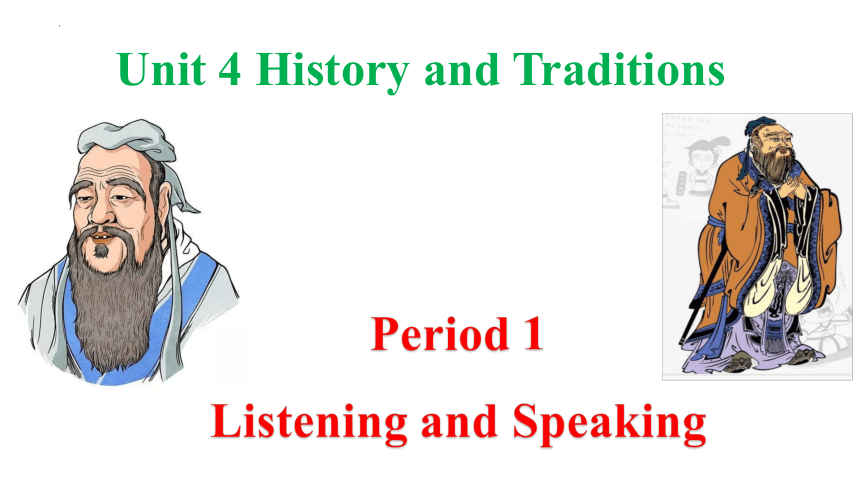 | |
| 格式 | pptx | ||
| 文件大小 | 32.5MB | ||
| 资源类型 | 教案 | ||
| 版本资源 | 人教版(2019) | ||
| 科目 | 英语 | ||
| 更新时间 | 2025-02-24 14:51:59 | ||
图片预览

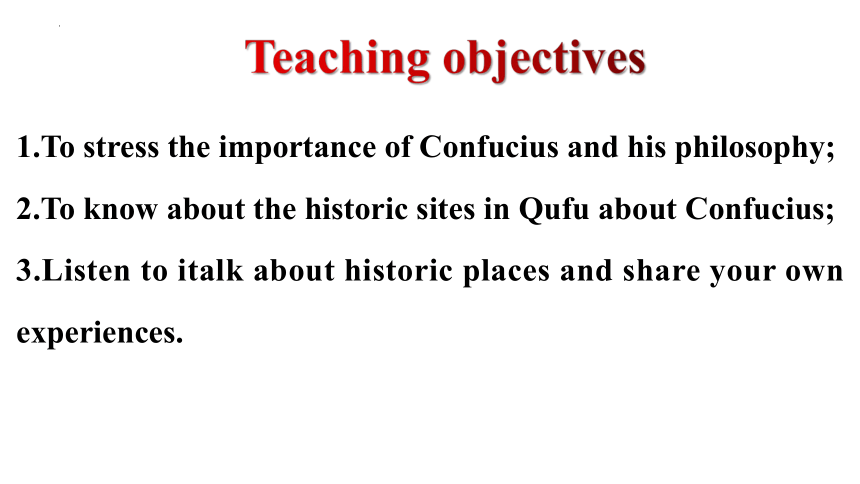
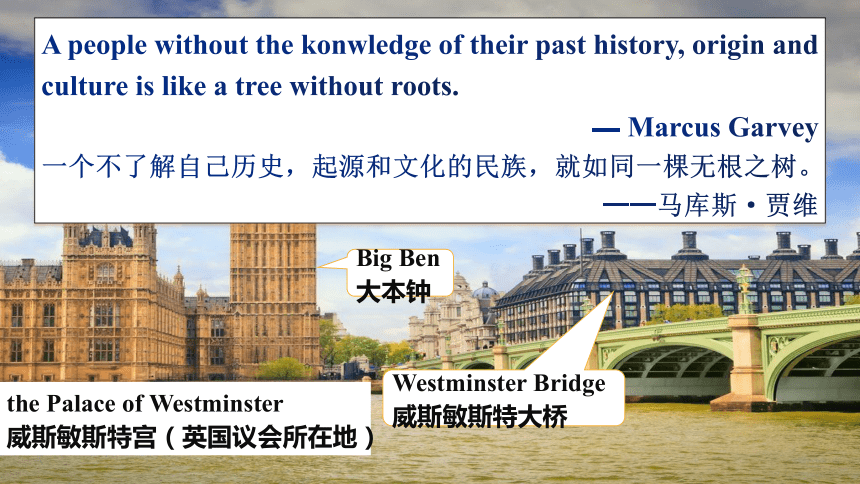
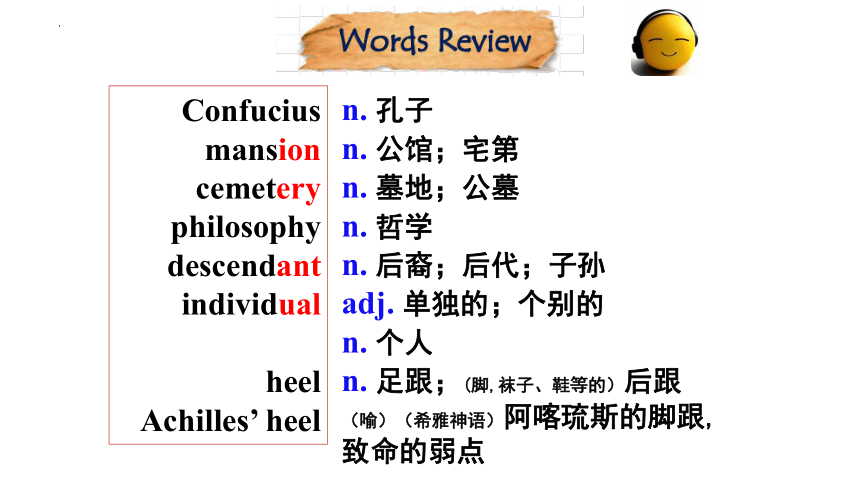

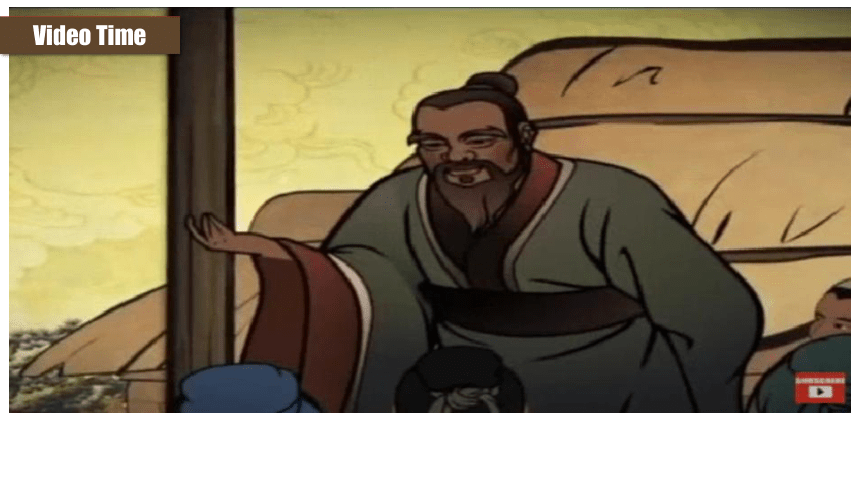

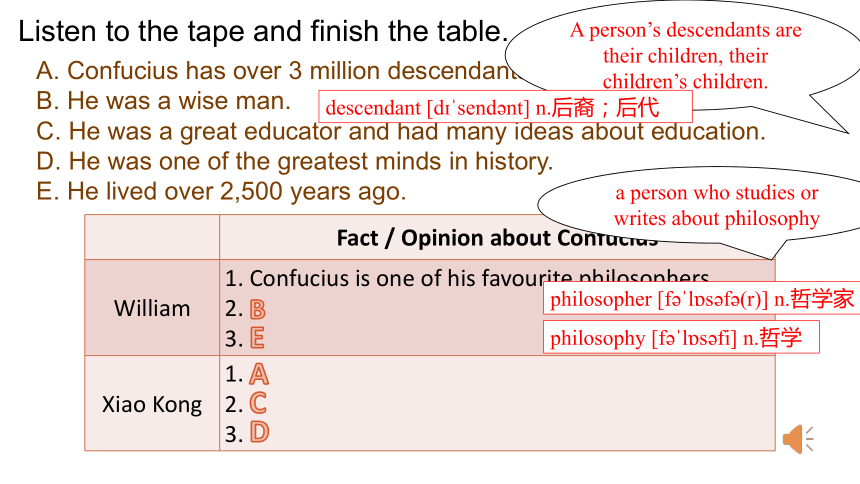
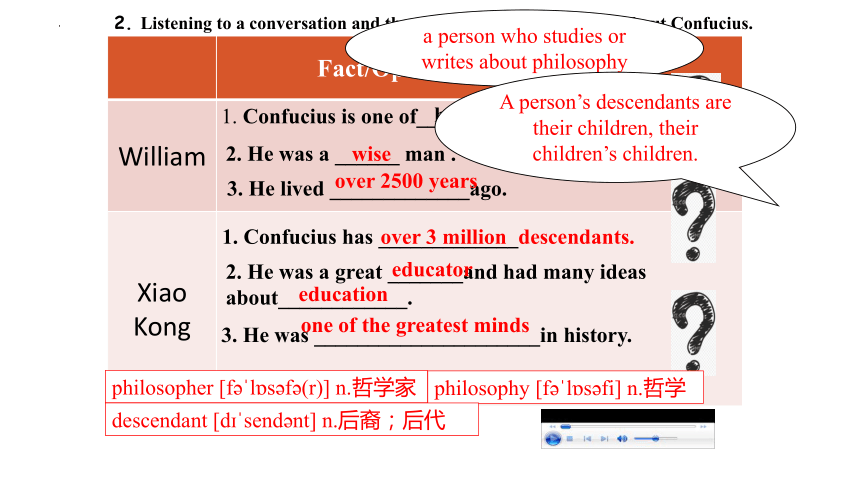
文档简介
(共24张PPT)
Unit 4 History and Traditions
Period 1
Listening and Speaking
Teaching objectives
1.To stress the importance of Confucius and his philosophy;
2.To know about the historic sites in Qufu about Confucius;
3.Listen to italk about historic places and share your own experiences.
A people without the konwledge of their past history, origin and culture is like a tree without roots.
--- Marcus Garvey
一个不了解自己历史,起源和文化的民族,就如同一棵无根之树。
——马库斯·贾维
Big Ben
大本钟
Westminster Bridge
威斯敏斯特大桥
the Palace of Westminster
威斯敏斯特宫(英国议会所在地)
Confucius
mansion
cemetery
philosophy
descendant
individual
heel
Achilles’ heel
n. 孔子
n. 公馆;宅第
n. 墓地;公墓
n. 哲学
n. 后裔;后代;子孙
adj. 单独的;个别的
n. 个人
n. 足跟;(脚,袜子、鞋等的)后跟
(喻)(希雅神语)阿喀琉斯的脚跟,
致命的弱点
Confucius
How much do you know about Confucius
What do you know about his ideas
Lead-in
Video Time
Before you listen, look at some photos of Qufu.
Temple of Confucius
Kong Family Mansion
Cemetery of Confucius
Pre-listening
(孔庙)
(孔府)
(孔林)
A. Confucius has over 3 million descendants.
B. He was a wise man.
C. He was a great educator and had many ideas about education.
D. He was one of the greatest minds in history.
E. He lived over 2,500 years ago.
Listen to the tape and finish the table.
Fact / Opinion about Confucius
William 1. Confucius is one of his favourite philosophers.
2.
3.
Xiao Kong 1.
2.
3.
B
E
A
C
D
a person who studies or writes about philosophy
A person’s descendants are their children, their children’s children.
philosopher [f l s f (r)] n.哲学家
philosophy [f l s fi] n.哲学
descendant [d send nt] n.后裔;后代
2. Listening to a conversation and then write down what they say about Confucius.
Fact/Opinion about Confucius
William 1. Confucius is one of_________________.
Xiao Kong
2. He was a ______ man .
3. He lived _____________ago.
3. He was _____________________in history.
2. He was a great _______and had many ideas about____________.
1. Confucius has _____________descendants.
a person who studies or writes about philosophy
philosopher [f l s f (r)] n.哲学家
philosophy [f l s fi] n.哲学
descendant [d send nt] n.后裔;后代
wise
over 2500 years
his favorite philosophers
over 3 million
A person’s descendants are their children, their children’s children.
educator
one of the greatest minds
education
1. Confucius said that learning without understanding leads to confusion.
2. Xiao Kong is doing a research project on Confucius philosophy.
3. As one of Confucius’ descendants, Xiao Kong’s name is recorded in the family tree.
4. Dacheng Hall is the tallest building in Qufu.
F
F
NM
T
3.Listen again and decide whether these statements are true(T), false(F) or not mentioned(NM). Then answer the question.
Why do you think William said his hometown was similar to Qufu
A. There are famous halls in his hometown.
B. There are no tall buildings in his hometown.
C. Both places have a famous person who was born there.
D. His hometown doesn’t allow other buildings to be more noticeable than the historic buildings.
Wiliam: Excuse me, do you speak English I'm looking for the Confucius Temple, but I’m not good at maps-they’re my Achilles’ heel!
Xiao Kong: Oh, hello, e with me-I’m going to the temple right now. By the way, what does “Achilles’ heel” mean
William: Oh, it means that something is my weakness-I'm really bad with maps! So do you know much about Confucius He's one of my favourite philosophers. He was such a wise man.
Xiao Kong: Oh, yes. I was born here. In fact, I believe I am a descendant of Confucius himself.
William: No way, you're pulling my leg, right So how do you know you're related to Confucius Didn't he live over 2,500 years ago
Xiao Kong: Yes, but his family tree is well recorded. He has over three million descendants. Sorry again, what does “pulling my leg” mean
William: Oh, sorry, it means to joke with someone. Anyway, so you're actually going to the temple to pay respects to your relative
听力材料
Xiao Kong: Well, yes. But I’m also meeting my study group there. We are doing a research project on Confucius’ ideas on education. You know, Confucius was a great educator, and he had many great ideas about education. For example, he talked about the relationship between learning and reflecting. He believed that learning without reflecting leads to confusion… Oh, look, the temple is just over there.
William: Oh, great! What's that big building over there
Xiao Kong: Oh, that’s the famous Dacheng Hall. You know, it's so well-respected in Qufu that no other building in the city can be taller than it.
William: Wow, now that’s respect. That’s a little bit like my hometown-Stratford-upon-Avon.
Xiao Kong: Wait, you mean where Shakespeare was from What a coincidence-Confucius and Shakespeare, two of the greatest minds in history! I really want to visit the UK-I’m really interested in British history and culture.
William: Oh, that’s great! So later we can go for a cup of tea and have a chat about it. And it would be great if you could take me somewhere to get my watch fixed.
Xiao Kong: OK, no problem! So come and meet my study group-we can tell you all about the temple. And how long are you staying in Qufu I can show you the Cemetery of Confucius and the Kong Family Mansion as well…
William: Really That’s so kind! I need all the help I can get-I'm like a fish out of water!
4. Write down the English idioms that are used in the conversation. Explain their meanings and think about some Chinese equivalents.
An idiom is an expression which means something different from the meaning of the individual words. Some idioms present an idea or paint a picture that gives a hint as to the meaning. Other idioms can only be understood from the context in which they appear.
English idioms
English idiom Meaning Chinese equivalent
Achilles’ heel
pull one’s leg
fish out of water
something that is someone’s weakness
to joke with someone
Something who feels uncomfortable because they are in an unfamiliar place
弱点;要害
戏弄
如芒在背
Discuss in paris and guess the Chinese equivalent of the
following English idioms.
English idiom Chinese equivalent
Love me, love my dog.
Kill two birds with a stone.
a piece of cake
When pigs fly
break a leg
祝你好运
爱屋及乌
一石二鸟
小菜一碟
母猪上树
Work in pairs!
Share your ideas with your partner.
Share your idea!
Speaking
Learning without reflecting leads to confusion.
学而不思则罔
Review the old and learn the new.
温故而知新
Make no social distinctions in teaching.
有教无类
To learn and at due time to repeat what one has learnt, isn't that after all a pleasure
学而时习之,不亦说乎?
Do not do to others what you do not want others to do to you.
己所不欲勿施于人
Confucius' ideas on education
Post listening
What else do you know about Confucius and his philosophy
Confucius was a great thinker, educator, and philosopher. His principles had a great influence on Chinese traditions and beliefs. He believed strongly in strong family loyalty and respect for others. He believed in the so-called “golden rule” of philosophy: Do not do to others what you do not want others to do to you.
一般来说,相邻的两个单词属于同一意群时,前一词末尾的某些音素和后一词词首的某些音素,可能会连起来读。
连读会使我们说的英语更加流畅、悦耳。但是,连读应是在一种快速语流中自然形成的现象,而不是为了连读而去连读。
1. 辅音+元音: 相邻的两词中,前一个以辅音结尾,后一个以元音开头时,一般将辅音和元音连起来读。
eg: not at all work it out
turn it off Please pick it up
连读
常见的几种连读情况:
3. 元音+元音:前一个单词以/i/或/i:/结尾,后一个单词以元音开头时,添加/j/后连读;前一个单词以/u/或/u:/结尾,后一个单词以元音开头,添加/w/后连读。
eg: I agree.
Go out.
/aij ɡri /
/ ɡ w a t /
2. 辅音字母r或re+元音:前一个词以-r或-re结尾,后一个词以元音开头,此时r或re要发/r/音,并与其后的元音连读。
eg: for us and for ever here and there
for instance Where is it
Read this part of the poem “If-” written by British poet Rudyard Kipling(拉迪亚德·吉卜林). Notice the linking sounds. Then mark the linking sounds after the model.
If you can make one heap of all your winnings
And risk it on one turn of pitch-and-toss,
And lose, and start again at your beginnings
And never breathe a word about your loss;
If you can force your heart and nerve and sinew
To serve your turn long after they are gone,
And so hold on when there is nothing in you
Except the Will which says to them: “Hold on!”
Repeat the poem after the recording.
Thank you
Unit 4 History and Traditions
Period 1
Listening and Speaking
Teaching objectives
1.To stress the importance of Confucius and his philosophy;
2.To know about the historic sites in Qufu about Confucius;
3.Listen to italk about historic places and share your own experiences.
A people without the konwledge of their past history, origin and culture is like a tree without roots.
--- Marcus Garvey
一个不了解自己历史,起源和文化的民族,就如同一棵无根之树。
——马库斯·贾维
Big Ben
大本钟
Westminster Bridge
威斯敏斯特大桥
the Palace of Westminster
威斯敏斯特宫(英国议会所在地)
Confucius
mansion
cemetery
philosophy
descendant
individual
heel
Achilles’ heel
n. 孔子
n. 公馆;宅第
n. 墓地;公墓
n. 哲学
n. 后裔;后代;子孙
adj. 单独的;个别的
n. 个人
n. 足跟;(脚,袜子、鞋等的)后跟
(喻)(希雅神语)阿喀琉斯的脚跟,
致命的弱点
Confucius
How much do you know about Confucius
What do you know about his ideas
Lead-in
Video Time
Before you listen, look at some photos of Qufu.
Temple of Confucius
Kong Family Mansion
Cemetery of Confucius
Pre-listening
(孔庙)
(孔府)
(孔林)
A. Confucius has over 3 million descendants.
B. He was a wise man.
C. He was a great educator and had many ideas about education.
D. He was one of the greatest minds in history.
E. He lived over 2,500 years ago.
Listen to the tape and finish the table.
Fact / Opinion about Confucius
William 1. Confucius is one of his favourite philosophers.
2.
3.
Xiao Kong 1.
2.
3.
B
E
A
C
D
a person who studies or writes about philosophy
A person’s descendants are their children, their children’s children.
philosopher [f l s f (r)] n.哲学家
philosophy [f l s fi] n.哲学
descendant [d send nt] n.后裔;后代
2. Listening to a conversation and then write down what they say about Confucius.
Fact/Opinion about Confucius
William 1. Confucius is one of_________________.
Xiao Kong
2. He was a ______ man .
3. He lived _____________ago.
3. He was _____________________in history.
2. He was a great _______and had many ideas about____________.
1. Confucius has _____________descendants.
a person who studies or writes about philosophy
philosopher [f l s f (r)] n.哲学家
philosophy [f l s fi] n.哲学
descendant [d send nt] n.后裔;后代
wise
over 2500 years
his favorite philosophers
over 3 million
A person’s descendants are their children, their children’s children.
educator
one of the greatest minds
education
1. Confucius said that learning without understanding leads to confusion.
2. Xiao Kong is doing a research project on Confucius philosophy.
3. As one of Confucius’ descendants, Xiao Kong’s name is recorded in the family tree.
4. Dacheng Hall is the tallest building in Qufu.
F
F
NM
T
3.Listen again and decide whether these statements are true(T), false(F) or not mentioned(NM). Then answer the question.
Why do you think William said his hometown was similar to Qufu
A. There are famous halls in his hometown.
B. There are no tall buildings in his hometown.
C. Both places have a famous person who was born there.
D. His hometown doesn’t allow other buildings to be more noticeable than the historic buildings.
Wiliam: Excuse me, do you speak English I'm looking for the Confucius Temple, but I’m not good at maps-they’re my Achilles’ heel!
Xiao Kong: Oh, hello, e with me-I’m going to the temple right now. By the way, what does “Achilles’ heel” mean
William: Oh, it means that something is my weakness-I'm really bad with maps! So do you know much about Confucius He's one of my favourite philosophers. He was such a wise man.
Xiao Kong: Oh, yes. I was born here. In fact, I believe I am a descendant of Confucius himself.
William: No way, you're pulling my leg, right So how do you know you're related to Confucius Didn't he live over 2,500 years ago
Xiao Kong: Yes, but his family tree is well recorded. He has over three million descendants. Sorry again, what does “pulling my leg” mean
William: Oh, sorry, it means to joke with someone. Anyway, so you're actually going to the temple to pay respects to your relative
听力材料
Xiao Kong: Well, yes. But I’m also meeting my study group there. We are doing a research project on Confucius’ ideas on education. You know, Confucius was a great educator, and he had many great ideas about education. For example, he talked about the relationship between learning and reflecting. He believed that learning without reflecting leads to confusion… Oh, look, the temple is just over there.
William: Oh, great! What's that big building over there
Xiao Kong: Oh, that’s the famous Dacheng Hall. You know, it's so well-respected in Qufu that no other building in the city can be taller than it.
William: Wow, now that’s respect. That’s a little bit like my hometown-Stratford-upon-Avon.
Xiao Kong: Wait, you mean where Shakespeare was from What a coincidence-Confucius and Shakespeare, two of the greatest minds in history! I really want to visit the UK-I’m really interested in British history and culture.
William: Oh, that’s great! So later we can go for a cup of tea and have a chat about it. And it would be great if you could take me somewhere to get my watch fixed.
Xiao Kong: OK, no problem! So come and meet my study group-we can tell you all about the temple. And how long are you staying in Qufu I can show you the Cemetery of Confucius and the Kong Family Mansion as well…
William: Really That’s so kind! I need all the help I can get-I'm like a fish out of water!
4. Write down the English idioms that are used in the conversation. Explain their meanings and think about some Chinese equivalents.
An idiom is an expression which means something different from the meaning of the individual words. Some idioms present an idea or paint a picture that gives a hint as to the meaning. Other idioms can only be understood from the context in which they appear.
English idioms
English idiom Meaning Chinese equivalent
Achilles’ heel
pull one’s leg
fish out of water
something that is someone’s weakness
to joke with someone
Something who feels uncomfortable because they are in an unfamiliar place
弱点;要害
戏弄
如芒在背
Discuss in paris and guess the Chinese equivalent of the
following English idioms.
English idiom Chinese equivalent
Love me, love my dog.
Kill two birds with a stone.
a piece of cake
When pigs fly
break a leg
祝你好运
爱屋及乌
一石二鸟
小菜一碟
母猪上树
Work in pairs!
Share your ideas with your partner.
Share your idea!
Speaking
Learning without reflecting leads to confusion.
学而不思则罔
Review the old and learn the new.
温故而知新
Make no social distinctions in teaching.
有教无类
To learn and at due time to repeat what one has learnt, isn't that after all a pleasure
学而时习之,不亦说乎?
Do not do to others what you do not want others to do to you.
己所不欲勿施于人
Confucius' ideas on education
Post listening
What else do you know about Confucius and his philosophy
Confucius was a great thinker, educator, and philosopher. His principles had a great influence on Chinese traditions and beliefs. He believed strongly in strong family loyalty and respect for others. He believed in the so-called “golden rule” of philosophy: Do not do to others what you do not want others to do to you.
一般来说,相邻的两个单词属于同一意群时,前一词末尾的某些音素和后一词词首的某些音素,可能会连起来读。
连读会使我们说的英语更加流畅、悦耳。但是,连读应是在一种快速语流中自然形成的现象,而不是为了连读而去连读。
1. 辅音+元音: 相邻的两词中,前一个以辅音结尾,后一个以元音开头时,一般将辅音和元音连起来读。
eg: not at all work it out
turn it off Please pick it up
连读
常见的几种连读情况:
3. 元音+元音:前一个单词以/i/或/i:/结尾,后一个单词以元音开头时,添加/j/后连读;前一个单词以/u/或/u:/结尾,后一个单词以元音开头,添加/w/后连读。
eg: I agree.
Go out.
/aij ɡri /
/ ɡ w a t /
2. 辅音字母r或re+元音:前一个词以-r或-re结尾,后一个词以元音开头,此时r或re要发/r/音,并与其后的元音连读。
eg: for us and for ever here and there
for instance Where is it
Read this part of the poem “If-” written by British poet Rudyard Kipling(拉迪亚德·吉卜林). Notice the linking sounds. Then mark the linking sounds after the model.
If you can make one heap of all your winnings
And risk it on one turn of pitch-and-toss,
And lose, and start again at your beginnings
And never breathe a word about your loss;
If you can force your heart and nerve and sinew
To serve your turn long after they are gone,
And so hold on when there is nothing in you
Except the Will which says to them: “Hold on!”
Repeat the poem after the recording.
Thank you
